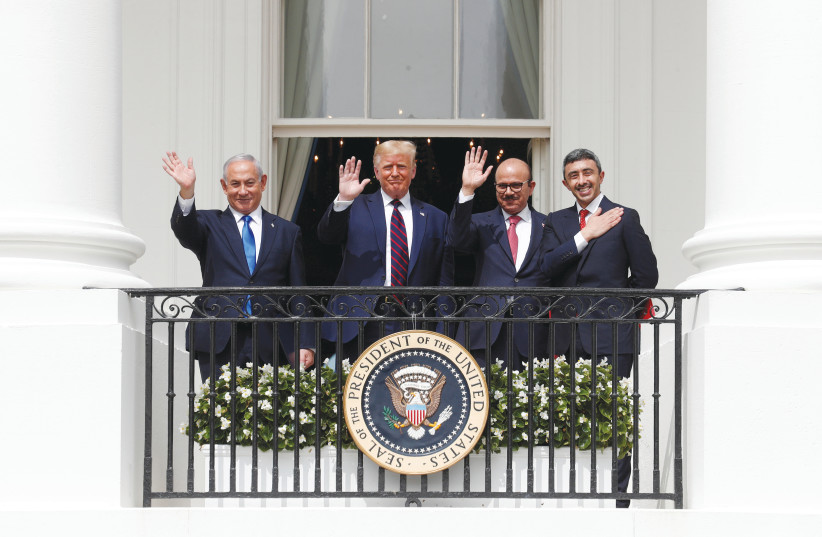One reason the Abraham Accords have been so successful is the economic element.
The normalizations between Israel and the United Arab Emirates, Bahrain and Morocco have all seen various degrees of immediate results, touted by all the countries involved. Looking only at foreign trade with the UAE, it’s easy to see the benefits of peace and normalization.
According to the Central Bureau of Statistics, in 2019, before the signing of the accords, exports from Israel to the UAE totaled $11 million, and imports were 0. In 2020, the year of the signing, exports amounted to $18m. and imports amounted to $75m. In the first eight months of 2021, exports from Israel to the UAE reached $68m. and imports reached $241m.
While not as dramatic, trade and ties with Bahrain and Morocco have also flourished. Israel and Bahrain signed a security agreement in February, Israel and the UAE signed a free trade agreement in May, and IDF Chief of Staff Aviv Kohavi recently visited Morocco. These are all being done in the public eye, with citizens of the Arab countries clearly aware that their governments are forging ties with the Jewish state.
Contrast that with the slow, cold peace that Israel has experienced with Egypt and Jordan for decades. While the fruits of the Abraham Accords were apparent from the beginning, the best that could be said for the peace agreements with Egypt and Jordan is that there has been quiet on the borders and a certain level of security coordination.

The Abraham Accords have also had a tangible effect on Jordan. A UAE-funded deal was signed in November to create a power plant in Jordan that will send electricity to the Palestinians and Israel, and a desalination plant in Israel that will send water to Jordan.
No longer enemies
However, to a large extent, Jordanian citizens haven’t internalized the fact that they are no longer enemies of Israel. When Israeli prime ministers or foreign ministers visit King Abdullah, Jordan keeps the meetings shrouded in as low-profile a manner as possible.
That’s what makes last week’s visit by Prime Minister Yair Lapid to Amman to meet with the monarch and this week’s cabinet announcement of developing Jordan Gate, a shared industrial zone with Jordan, so significant.
The idea of a joint industrial zone was first raised in peace talks between Israel and Jordan. The plan includes an already constructed bridge between the Jordanian and Israeli sides of the park. The government plans to establish medium-term and long-term plans for attracting business to the industrial zone, which is near Kibbutz Tirat Tzvi.
“Twenty-eight years after making peace with Jordan, we are taking our good neighborly relations another step forward. This is a breakthrough that will greatly contribute to developing and strengthening the area,” said Lapid.
He continued, “This is an initiative that will bring employment to both countries, will advance our diplomatic and economic relations and will deepen the peace and friendship between the two countries. It will allow Israeli and Jordanian entrepreneurs and businesspeople to communicate directly. It will create shared initiatives for trade, technology and local industry.”
Regional Cooperation Minister Esawi Frej added the kicker, a lesson learned from the Abraham Accords: “We are now taking a step toward peace between citizens, not just between the countries, but between the nations. Peace between us is incomplete without economic and civil cooperation that allows the citizens of the countries to enjoy its fruit,” he said.
In order for Jordan to slowly drag its peace agreement out of the shadows and into the open, it needs to show some benefits to its people. The park is a small but significant step toward that aim. Perhaps that’s why when Abdullah met with Lapid last week, it was an official visit with photographs allowed, instead of the usual clandestine summits that have taken place in the past.
If the kingdom throws its weight behind relations with Israel, then the socialization process within Jordanian society will likely begin to move forward. The examples of the Abraham Accords demonstrate what is possible when both a country’s government and its people buy into the ideas of peace, normalization and prosperity.
Israel has long been Jordan’s mistress, kept under wraps, only whispered about and often shunned. What’s now happening between Israel and Jordan indicates that there is actually a marriage – one that began in 1994 and is finally getting a chance to flourish.
